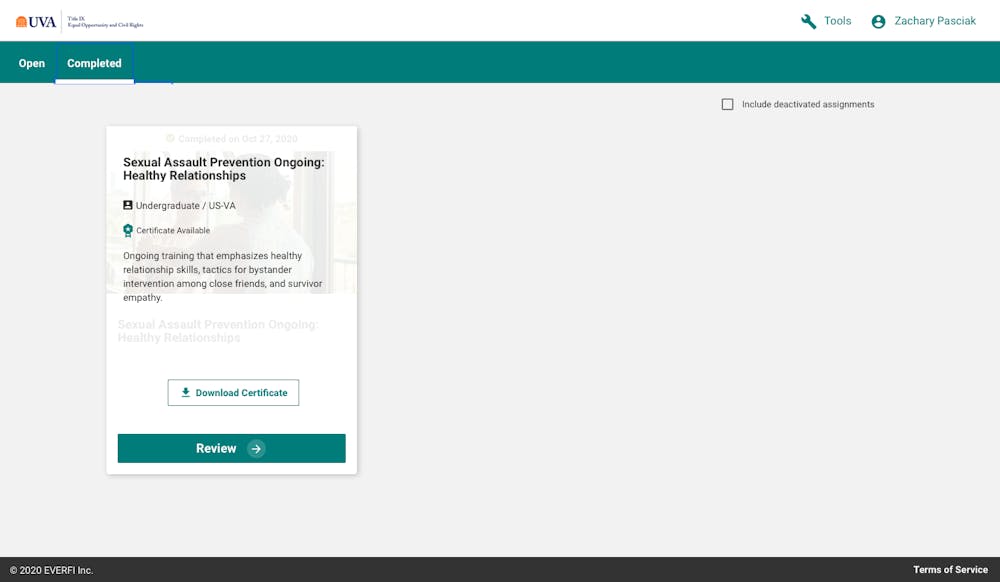Every fall, incoming students at the University are required to complete a short training module on sexual assault prevention. Sexual assault is an extremely prevalent issue throughout the country, especially on college campuses, where 13 percent of students will experience non-consensual sexual contact. Unfortunately, students at the University also deal with sexual assault at similar rates — for the 2018-2019 school year, the University’s sexual assault and harrassment survey indicated that roughly 13.4 percent of female respondents and 4.2 percent of male respondents reported experiencing sexual assault by physical force. Educational training on these issues can provide students with the tools needed to adequately address sexual harassment and violence. However, the University fails to effectively provide these resources.
All students at the University are required to complete EverFi training on sexual assault prevention. The module consists of videos, questions and readings on how to identify and respond to issues of sexual violence and harassment. However, these modules are inefficient and do not do enough to engage students. Very little engagement is required — students can simply click through the content and play the instructional videos passively without truly understanding or engaging with the material. Additionally, the modules are treated as a chore or something to check off of a to-do list, rather than an opportunity to address and educate on the issue of sexual assault. The University should replace these passive modules with meaningful and engaging conversations. Speaking with experts, active participation and the opportunity to ask questions in real time will better educate and engage students with the material.
While the current modules can be informative and inclusive, the content holds no value if students are not actively learning and absorbing the material. Online click-through assignments like EverFi’s won’t improve education on how to prevent sexual assault — instead, we need live discussions that encourage participation, challenge assumptions and build confidence with reporting and recognition of sexual assault cases. Students will not be encouraged to engage with and absorb the given materials unless a productive discussion is had. Sexual assault is still a sensitive topic, and it is therefore rarely openly discussed. Thus, students possess varying knowledge on the topic, and it is the University’s responsibility to keep students educated and safe.
Some students are exposed to a program called Dorm Norms, in which peer education groups — such as Culture of Respect Educators — hold informal discussions on sexual assault for first years. Unfortunately, these information sessions are only available for first years living on Grounds. Additionally, their resident advisor must take the initiative to request a session for their residents. At my own Dorm Norms meeting, the session leader asked and answered questions, gave us helpful tips and statistics and made the content relevant and personal to us. It was over Zoom due to COVID-19, but still much more effective and interesting than the module system because participation was required. This type of interactive discussion will be the most effective means of educating students and cultivating safety, and it should not rely on RAs’ promotion.
Personal and engaging interaction with the material is essential to students’ understanding of how to identify and respond to instances of sexual assault. As such, the University should also offer a one-credit course on sexual assault prevention so every student can be exposed to this crucial information if they choose to educate themselves further. Every student needs to be equipped with adequate skills to recognize and respond to sexual assault issues, as attacks could happen to anyone. Colleges and universities often fail to support sexual assault survivors mentally and legally — the University is no exception. In addition, the Trump administration has made it more difficult for sexual assault survivors to get justice through Title IX alterations. Thus, the University has a responsibility now more than ever to support sexual assault prevention initiatives.
Further, the University currently does not offer an alternative to the current online educational modules for survivors of sexual assault. Survivors are forced to sit through a very triggering experience during these modules, which can be incredibly detrimental to their mental health. The University should let students tell their RA that they would like to opt-out of the module — no questions asked. The University should strictly provide supportive resources for survivors instead of requiring them to relive their experiences.
In order to serve its purpose, University-wide sexual assault prevention training must be sustained. A quick 20-minute course in the beginning of the year will not create a culture of safety and trust. Supporting initiatives year-round requires active acknowledgement of sexual assault within the University community. Treating sexual assault prevention as a required assignment that blocks our ability to register for classes diminishes its importance and relevance. Every student should be required to attend thoughtful and engaging discussions on healthy relationships, sexual violence and harassment. At the same time, the University must focus on education, advocacy and legal support for survivors. Education is the foundation of a community of respect, and the University’s current modules are simply not cutting it.
Nicole Chebili is an Opinion Columnist for The Cavalier Daily. She can be reached at opinion@cavalierdaily.com.
The opinions expressed in this column are not necessarily those of The Cavalier Daily. Columns represent the views of the authors alone.





